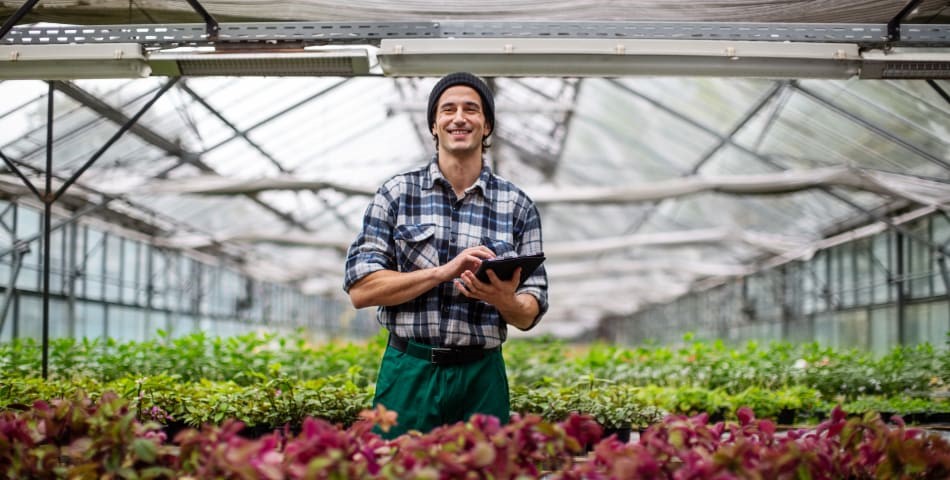A guide to organic farming degrees and careers

Published: October 7, 2020
Category: The Organic & Non-GMO Report Newsletter, Organic News
At a glance:
- Organic farming and sustainable agriculture can be studied at the college level.
- Demand for organic food continues to grow, making it a solid career path for students.
- Students can choose from multiple careers, such as farmer, consultant, or inspector.
The future of conventional farming doesn’t exactly inspire optimism. The Bureau of Labor Statistics (BLS) projects that employment for farmers will decline 1% over the next decade. This year threw that projection into even more uncertainty, with the COVID-19 pandemic greatly affecting agriculture —not to mention nearly every other industry.
From 2011 to 2017, the number of organic farms in the U.S. increased by almost 75%.
Despite these unsettling predictions, one sector in the agriculture industry has maintained a steady upward trajectory for several decades: organic farming.
From 2011 to 2017, the number of organic farms in the U.S. increased by almost 75%. By the end of this period, there were nearly 16,000 organic farms.
Still, the percentage of organic farms in the U.S. remains relatively low compared with the agriculture industry at large. Of the 900 million acres of farmland in 2017, about 9 million acres grew certified organic food, meaning that only 1% of the country’s farmland was dedicated to producing certified organic products.
As the agriculture industry faces a turbulent future, organic farming continues its upward trend. And consumers aren’t the only ones investing in organic products. In 2018, Congress passed an $867 billion farm bill, which allocates research funds to organic farming.
The growth of the organic agriculture industry
Despite the gray areas in research, a Pew Research Center study found that Americans often choose organic foods for ethical reasons and because they believe such products are healthier.
In the past three decades, these beliefs have grown even stronger.
Organic food sales topped $50 billion in 2019 — that’s about double what it was the previous decade.
Retail sales of organic food increased every year between 1994 and 2014, from less than $5 billion to almost $35 billion.
Much of this growth occurred during the past two decades. Documentaries like 2008’s “Food, Inc.” and 2011’s “Farmaggedon” symbolize the cultural paradigm shift in organic food.
Millennials have also spurred consumer interest in organic products. In a 2014 Gallup survey, more than half of respondents aged 18-29 reported trying to include organic foods on their grocery runs, while the same was true for just one-third of respondents aged 65 or older.
These days, finding organic groceries at the supermarket is as easy as spotting tabloids in the check-out aisle.
Where can you study organic farming?
Many schools offer degrees, as well as certificates and training programs, in organic agriculture. Below is a selection of undergraduate programs in organic farming at colleges and universities across the country.
UNDERGRADUATE ORGANIC AGRICULTURE PROGRAMS
- Cornell University’s BS in Agricultural Sciences (Concentration in Organic Agriculture)
- Iowa State University’s Organic Agriculture Program
- Maharishi International University’s (Iowa) BA in Regenerative Organic Agriculture
- Michigan State University’s BS in Horticulture (Concentration in Sustainable and Organic Horticulture; Organic Farming Training Program
- Oregon State University’s Organic Agriculture Program
- University of Florida’s BS in Horticultural Science (Concentration in Organic Horticultural Systems)
- University of Georgia’s Certificate in Organic Agriculture
- University of Minnesota’s BS in Food Systems (Concentration in Organic and Local Food Production)
- University of Tennessee’s BS in Plant Sciences (Concentration in Organic Production)
- Washington State University’s BS in Organic and Sustainable Agriculture; Certificate in Organic Agriculture
What can you do with an organic agriculture degree?
One popular career option for organic agriculture students is to become an organic farmer, which normally involves managing other employees and carrying out essential tasks like marketing and selling food.
Other career paths include working for the USDA, in which you could contribute to the organic food certification process, and finding a job as an inspector, in which you would evaluate farms for federal or state government agencies.
Many students stay in academia as well, eventually earning a master’s degree or Ph.D. in organic agriculture or a related field.
You could also become a consultant, helping farmers expand their operations and strategize to overcome challenges. Alternatively, you might try your hand at working as a purchasing agent or buyer for grocery stores or restaurants.
Many students stay in academia as well, eventually earning a master’s degree or Ph.D. in organic agriculture or a related field. A doctorate can help individuals land jobs in academic or industry research.
Source: Best Colleges
To view source article, visit:
https://www.bestcolleges.com/blog/organic-farming-degrees-careers/




